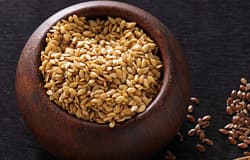Flax fiber suppresses appetite and food intake Tuesday, January 24, 2012. An article published online on January 11, 2012 in the journal Appetite reports the finding of researchers from the University of Copenhagen in Denmark of an appetite-suppressing effect for flaxseed in healthy young men and women. In one crossover study, 24 men and women underwent an overnight fast after which they were assigned to a drink containing 2.5 grams soluble flaxseed fibers or no fiber. Appetite was assessed every 30 minutes for two hours. A meal was then served to the participants and food consumption measured. Test days were separated by a period of at least two days. A second crossover study involved 20 participants, and compared the effects of same flax-containing drink to flax fiber tablets taken with the control beverage. While the flax drink decreased hunger and food intake in comparison with the control beverage, no significant differences were observed between the effects of the flax drink and flax tablets. Calorie intake was 9 percent less after consuming the flax drink in comparison with that of subjects who consumed the control beverage. In their discussion of the findings, the authors note that studies have associated increased meal viscosity, such as occurs with the addition of viscous fibers, with a delay in gastric emptying, resulting in an increase in the extent and duration of stomach distension. This, in turn causes increased feelings of satiety. Additionally, viscous fiber intake can help normalize blood glucose and insulin, which may also help suppress hunger and reduce food intake. "As obesity is closely connected with appetite, regular ingestion of flaxseed fiber in a low-energy beverage prior to each meal may help to maintain or lose weight as suppression of hunger between meals may aid adherence to a calorie-restricted diet," Sabine Ibrugger and colleagues write. "The advantage of flaxseed fibers over other dietary fibers is that already a dose of 2.5 grams is sufficient to impact appetite. This is a considerably smaller amount than in most other studies, which administered dietary fiber doses ranging from 5 to 12 grams." "The ingestion of the flaxseed fiber, both as a powder and tablets, increased satiety and decreased energy intake at a subsequent meal," they conclude. "The administration as tablets may constitute a more palatable and convenient alternative to viscous beverages." |
 |
| An article published online on January 11, 2012 in the American Journal of Clinical Nutrition reveals the presence of longer telomeres among men who consume fewer calories in comparison with those who consumed more. Telomeres are protective caps at the ends of chromosomes that shorten with age, and are used as a biomarker of cellular aging. Researchers from Hebrew University in Israel and the University of Medicine and Dentistry of New Jersey analyzed data from 405 men and 204 women who participated in the Jerusalem LRC Prevalence Study, a long term observational study of Jerusalem residents. Leukocyte (white blood cell) telomere length was measured in blood samples obtained between 1989 and 1991, and at follow-up, which occurred an average of 13.1 years after baseline. Dietary questionnaire responses provided data on daily calories and foods consumed. Lower calorie intake at baseline and follow-up were associated with longer telomere length in men, whereas the association with women was not significant. Further analysis determined that the association was restricted to those who never smoked. Of foods consumed, decreased unsaturated fatty intake had the strongest association with longer telomeres. "We found calorie intake at a mean age of 30 years to be significantly inversely associated with leukocyte telomere length at the mean ages of 30 and 43 years but not with leukocyte telomere length change during the relatively brief 13 year window of follow-up," the authors write. "This finding was confined to men and was evident for all of the macronutrients (although more so for unsaturated fatty acids), suggesting that energy per se, and not specific nutrients, might play a role." "The inverse calorie intake–leukocyte telomere length association is consistent with trial data showing beneficial effects of calorie restriction on aging biomarkers," they conclude. |
|

| Mitochondrial Energizer with BioPQQ™
Item #01568 |  | | Aging is characterized by inflammation, glycation and mitochondrial decay. Life Extension® members now have access to a state-of-the-art nutritional formula called Mitochondrial Energy Optimizer with BioPQQ™ that not only protects delicate cellular structures and enables cells to perform life-sustaining metabolic processes … it also helps generate new mitochondria! This formula is designed to counteract age-related structural and functional changes and promote biogenesis with these unique ingredients: - PQQ
- Carnosine
- Luteolin
- Benfotiamine
- Pyridoxal 5'-Phosphate
- R-Lipoic Acid
- Acetyl-L-Carnitine Arginate
| |
Vitamin C with Dihydroquercetin
Item #00927 |  | | Because humans do not manufacture vitamin C internally, it must be obtained through dietary sources or supplements. Few people realize, however, that vitamin C is a water-soluble nutrient that is quickly oxidized and excreted by the body, which limits its efficacy. Until now, those seeking to capture vitamin C's optimal health benefits have had no choice but to consume it several times throughout the day. Fortunately, a flavonoid antioxidant known as dihydroquercetin functions as a vitamin C "supercharger." Studies demonstrate that dihydroquercetin acts to inhibit the oxidation of vitamin C, thereby helping maintain its concentration and recycle vitamin C throughout the body. This synergistic relationship between dihydroquercetin and vitamin C greatly enhances the efficacy of both molecules in the body's organs and tissues. Vitamin C with Dihydroquercetin was formulated for those seeking to obtain optimal efficacy and antioxidant protection from a vitamin C supplement. | |
|










